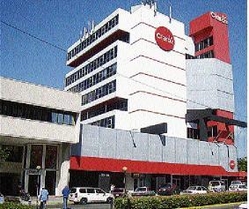
Claro headquarters in New Kingston. -
Having long spilled over from the boardroom to the media to the courtroom, the war being waged by the three main players in the mobile telephone market has now reached the desk of Jamaica's competition watchdog, the Fair Trading Commission (FTC).
The FTC confirmed this week that it was investigating a complaint by mobile market leader, Digicel Jamaica.
The company, which has shaken up the telecoms market here since it debut in 2001, alleges that its rivals, LIME and Claro Jamaica, are engaging anti-competitive behaviour involving collusion and price fixing.
The charge flows from the move in September by LIME, the former monopoly, to slash by some 42 per cent the rate its mobile customers pay for calling subscribers of Claro, the newest telecoms entrant.
LIME is the new trading name adopted by Cable and Wireless for its Caribbean-wide operations.
The rate cut resulted in a significant reduction from $12 per minute to $7 for post-paid calls while slicing rates by $2 to $8 $2 and $4, to $8, depending on the calling plan.
LIME's prepaid customers now pay about $8 per minute to call Claro phones.
In contrast, Digicel subscribers continue to pay $17.70 for each minute spent on the LIME or Claro network.
Claro, in particular, has been hammering Digicel on this point in its latest attack advertisements.
"We have filed a complaint that relates to the mobile termination rates which were offered by Cable and Wireless, and agreed between themselves and Claro, and our contention is what we feel is their anti-competitive conduct in relation to not only that, but also in the fixed line market as well," Richard Fraser, Digicel's head of legal and regulatory affairs, told the Financial Gleaner.
"LIME offered Digicel the same reciprocal termination rates offered to Claro and Digicel refused," LIME's Country Manager Geoff Houston has shot back.
Houston insists this is a material fact that must be disclosed to the FTC.
Houston's assertion that the same deal had been placed on the table in talks with Digicel is being supported by his vice-president of corporate communications, Errol Miller, who contends that several meetings were held on the matter with Digicel, as well as telecoms regulator, the Office of Utilities Regulation (OUR).
Houston has dismissed Digicel's latest claim as "nothing more than a spurious attempt to keep inflated prices in the market".
And in the seemingly endless trading of barbs and lawsuits, the LIME Jamaica boss further contends that this complaint by Digicel is designed to "distract the FTC from applying its energies to constraining Digicel's anti-competitive practices".
But, as the FTC has pointed out, it can only make a ruling on their perception of any breach of the Fair Trade Competition Act and then seek a court determination of the matter
"We enforce the Fair Trade Competition Act, and a few of the components of that act establish a breach only if competition is harmed in some way," said Dr Kevin Harriott, head of the Competition Bureau at the FTC.
"Once we can show that there is a reasonable likelihood that it could harm, we will pass this information to the legal department to decide if we are going to court, or come to some agreement with the parties, but the decision is made above us."
The fair trade official likens the agency's role to the investigative functions of the police.
"Their having an arrangement in and of itself is not prohibited," said Harriott, referring to LIME and Claro.
"It is the effect of such an agreement on competition that we look on."
In addition to its agreements on rates, LIME and Claro had inked an accord
Claro says it has 470 towers and plans to construct up to 610, while Digicel has put its tower count at 1,200.
LIME has not disclosed its number of towers sites.
mark.titus@gleanerjm.com